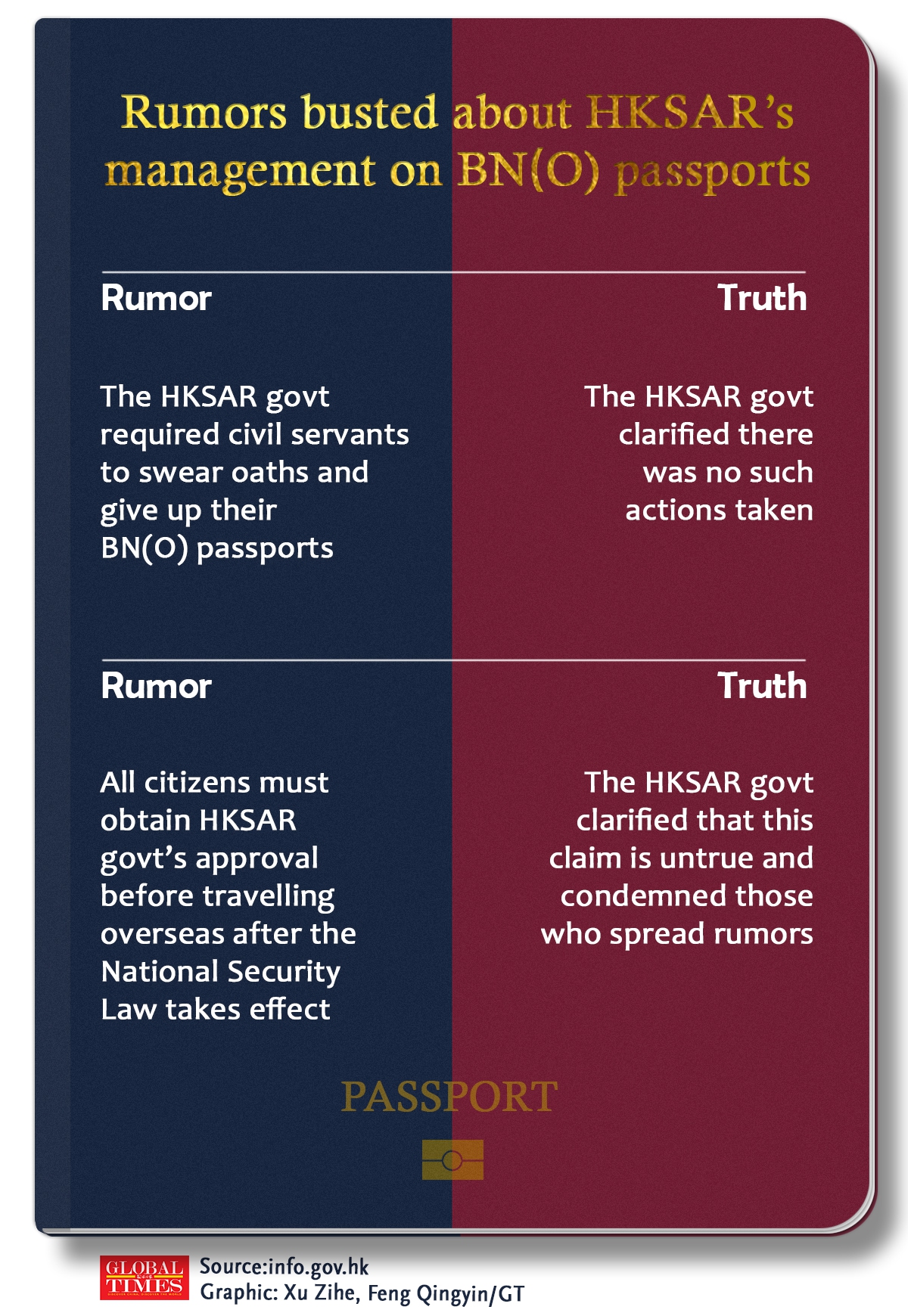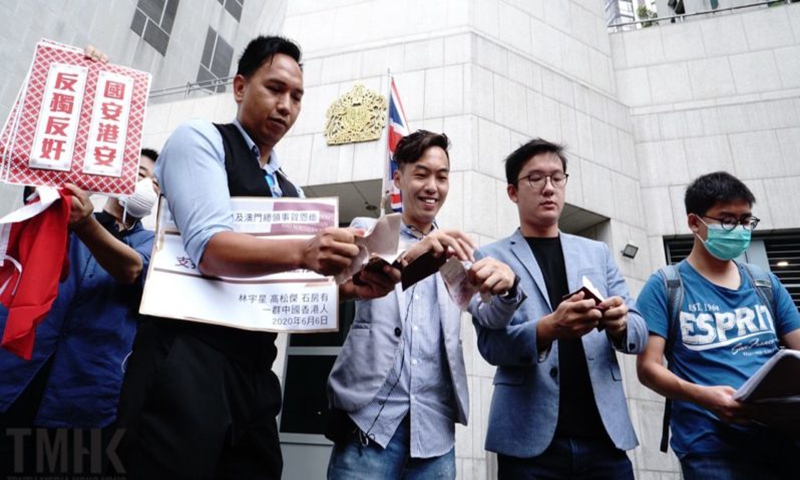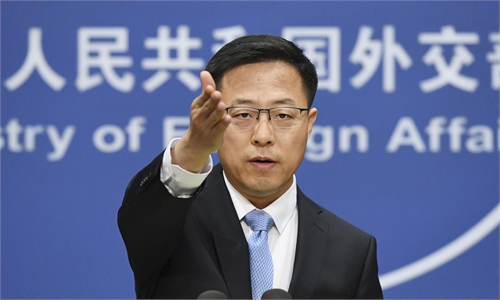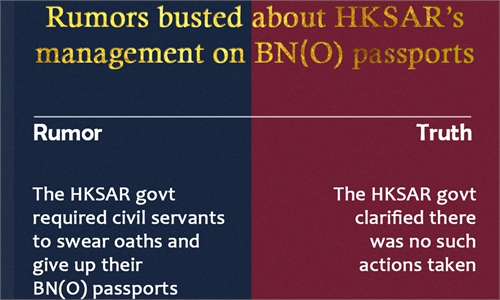
Rumors busted about HKSAR's management on BN(O) passports
China has officially withdrawn its recognition of British National (Overseas), or BN(O), passports as a valid travel and ID document starting from Sunday (January 31) as the UK began accepting citizenship applications for BN(O)-eligible Hong Kong residents starting on the same day. Experts said this is just the first of many countermeasures that China can take to retaliate against the UK regarding the violation of China's sovereignty.
Experts from the Chinese mainland and Hong Kong said Sunday that the UK's aggressive move will trigger a series of responses from the Chinese government including banning Hong Kong BN(O) passport holders who obtain UK citizenship via the new UK visa scheme from entering the political system of the Hong Kong Special Administrative Region (HKSAR). They called the countermeasures a wise option to minimize potential impacts, precisely striking against foreign forces trying to meddle in the Hong Kong affairs.
Despite Joe Biden taking office in the US and some members of the Five Eyes Alliance, like Australia, showing intent to alter their hostile policies toward China, the UK will remain a unique case continuing to confront China in an attempt to reinforce its "major power image" after the Brexit. As a result, China-UK ties will experience more frictions and conflicts not only regarding Hong Kong SAR but also on China's Xinjiang, the South China Sea and in the science and technology arena.
Zhao Lijian, a spokesperson for the Chinese Foreign Ministry, said on Friday, "In disregard of China's solemn position and the fact that it has been 24 years since Hong Kong returned to the motherland, the British side blatantly violated its commitment, formulated the so-called bespoke policy of abode and citizenship in the UK for BN(O)s and continued to expand its scope of application."
By trying to turn many Hong Kong residents into "second-class citizens" in the UK, Britain has discarded the mutual understanding on the BN(O) between China and the UK, Zhao said. "The 'BN(O)' today is nothing like what it was."
Two top Chinese authorities overseeing Hong Kong affairs denounced UK's new immigration scheme for BN(O) holders on Sunday, as the liaison office of the central government in Hong Kong and the Hong Kong and Macao Affairs Office of the State Council calling it an act of treachery and manipulation to turn a large proportion of the Hong Kong people into "second-class citizens."
The UK boastfully claimed to respect its "historical ties and friendship" with Hong Kong, beautified its history of colony and of invasion in an undisguised way, which was shameless logic of robbery, the Hong Kong and Macao Affairs Office of the State Council said.
The UK's move grossly violates China's sovereignty, interferes in both Hong Kong and China's internal affairs, and runs counter to international law and basic norms governing international relations. China deplores and firmly rejects this, Zhao remarked. "And we reserve the right to take further action."
More to come
Regarding further countermeasures against the UK for opening a pathway for Hong Kong BN(O) holders, some experts believe that China will take further action after evaluating the actual impact of this new immigration scheme. For example, after taking into account the real numbers of those people applying for citizenship, authorities will evaluate whether it will impact the interests of Hong Kong.
Tian Feilong, an associate professor at Beihang University in Beijing and a member of the Beijing-based Chinese Association of Hong Kong and Macao Studies, told the Global Times that withdrawing the recognition of BN(O) passports is just the first step. "To further adjust the legal status of the BN(O), China's top national legislature - the National People's Congress - needs to interpret the legislature for a second time in order to clarify issues related to 'single nationality' that has legal implications in Hong Kong and the details of its application."
"For those applying for the new immigration scheme the UK offered to relevant people in the HKSAR, local laws in Hong Kong need to be further rectified in imposing restrictions on their civil and political rights, including the right of abode, of welfare and casting votes," Tian said, adding that it will also help safeguarding the fundamentals as "Hong Kong patriots governing Hong Kong."
Although Tam Yiu-chung, a member of the Standing Committee of the National People's Congress, said there is no arrangement for further interpretation of the legislature at the NPC Standing Committee, under local laws in Hong Kong - the immigration ordinance - those applying for the UK's immigration pathway scheme - would be automatically deprived of their permanent residence status in Hong Kong.

Hong Kong residents tear up BN(O) passports in front of the consulate to protest against UK interference over the national security law. File Photo: Courtesy of Ko Chung Kit Jack
Minimizing the impact
When reporting on the BN(O) issue, some Western media outlets have been trying to exaggerate the impact and demonize China's countermeasures. For instance, the Guardian said in a report on Sunday that the UK's "new visa scheme offering millions of Hong Kong residents a pathway to British citizenship will go live on Sunday as the UK opens its doors to those wanting to escape China's crackdown on dissent."
Analysts said a majority of Hong Kong residents will not share such a pointless sentiment mentioned by Western media, as they have no reason to escape from their hometown which restored public order in July 2020 following the enactment of the national security law for Hong Kong. The law only targets a small part of secessionist and extreme anti-government activities, and not many Hong Kong residents would want to flee to a foreign country that has been engulfed in severe COVID-19 crisis, and these voices in the West are just trying to legitimize the UK's faithless act, stigmatizing China's efforts in restoring public order and stability in the city.
Kennedy Wong Ying-ho, a solicitor at the Supreme Court of Hong Kong, told the Global Times the countermeasures from Chinese authorities on the UK's scheme will not affect a large proportion of ordinary Hong Kong people, as long as those who have BN(O) passports don't apply for the UK's citizen pathway program. "It specifically targets those who want to apply for British citizenship through the BN(O) scheme," Wong said on Sunday.
Those who apply for UK citizenship would be deprived of their permanent residence status, which means they will not be eligible to engage in the civil service sector, Wong noted.
London's ambition
The UK doesn't show any intent to adjust its policy toward China like what other Five Eyes Alliance members, such as the US and Australia, are attempting to do and will be more offensive and continue causing trouble, said Chinese mainland experts.
Cui Hongjian, director of the Department of European Studies at the China Institute of International Studies, told the Global Times, "The UK has never considered itself as 'another Australia in Europe.' It has always seen itself as a major power and has to be unique, especially after Brexit."
When the US attempted to prevent its allies from joining the Asian Infrastructure Investment Bank, the UK was the first major Western power and the first key US ally to join the China-initiated bank, surprising many, "so the UK has always been different to other Western countries, and the elites in the UK are just following the same contrarian logic being tough against China when other Western countries seek adjustment regarding their China policies," Cui noted.
In the future, as long as China continues implementing the national security law in the HKSAR, there will be more frictions between China and the UK, and not only in Hong Kong. The UK will also follow the US to cause trouble on Xinjiang and in science and technology, said Chinese analysts.
The UK also plans to dispatch its aircraft carrier HMS Queen Elizabeth to the Asia-Pacific region and even the South China Sea this year. According to the announcement of the UK's Department for International Trade, the country also applied to join the Comprehensive and Progressive Trans-Pacific Partnership (CPTPP).
The ambition of the UK to reshape its "major global power" image after the Brexit is clear, and its intention to be more deeply involved in the Asia-Pacific region is also obvious, so China needs to be prepared for more potential conflicts and frictions with the UK, Cui said.





